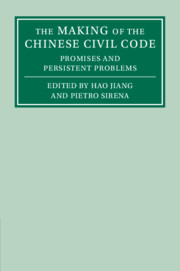Book contents
- The Making of the Chinese Civil Code
- The Making of the Chinese Civil Code
- Copyright page
- Dedication
- Contents
- Tables
- Contributors
- Preface
- Acknowledgements
- Abbreviations
- 1 The Making of a Civil Code in China
- 2 Personality Rights in China’s New Civil Code
- 3 Force Majeure or Change of Circumstances
- 4 Article 580 (2) of the Chinese Civil Code
- 5 Contractual Consent in the New Chinese Civil Code
- 6 The Security Interests in Chinese Law
- 7 Chinese Tort Law in the Era of the Civil Code
- 8 Causation in the Chinese Civil Code
- 9 The Aims of Tort Law across China and the West
- 10 Classifying the Passive Appreciation of Separate Property during Marriage in the Chinese Civil Code
- 11 The Rule of Law in Traditional China
- 12 The Private Law Influence of the Great Qing Code
- 13 The New Validity Rules in Chinese Civil Code and Chinese State-Owned Enterprises’ Freedom in Contracting
- 14 Chinese Civil Law and Soviet Influences
- 15 The Connections between Roman Law and Chinese Civil Law
- Index
3 - Force Majeure or Change of Circumstances
An Enduring Dichotomy in Chinese Law?
Published online by Cambridge University Press: 31 August 2023
- The Making of the Chinese Civil Code
- The Making of the Chinese Civil Code
- Copyright page
- Dedication
- Contents
- Tables
- Contributors
- Preface
- Acknowledgements
- Abbreviations
- 1 The Making of a Civil Code in China
- 2 Personality Rights in China’s New Civil Code
- 3 Force Majeure or Change of Circumstances
- 4 Article 580 (2) of the Chinese Civil Code
- 5 Contractual Consent in the New Chinese Civil Code
- 6 The Security Interests in Chinese Law
- 7 Chinese Tort Law in the Era of the Civil Code
- 8 Causation in the Chinese Civil Code
- 9 The Aims of Tort Law across China and the West
- 10 Classifying the Passive Appreciation of Separate Property during Marriage in the Chinese Civil Code
- 11 The Rule of Law in Traditional China
- 12 The Private Law Influence of the Great Qing Code
- 13 The New Validity Rules in Chinese Civil Code and Chinese State-Owned Enterprises’ Freedom in Contracting
- 14 Chinese Civil Law and Soviet Influences
- 15 The Connections between Roman Law and Chinese Civil Law
- Index
Summary
This chapter explores the unbalanced interrelationship between the twin doctrines of force majeure and change of circumstances under Chinese law. It examines key judicial documents and cases, as well as legislative materials (including the Chinese Civil Code), and identifies two factors which not only have contributed to Chinese courts’ excessive reliance on the doctrine of force majeure, but have also plagued this area of Chinese law with dogmatism, arbitrariness and utter whimsy. Such factors comprise a general tendency to categorically characterise a supervening event as force majeure and Chinese courts’ misinterpretation and unwarranted extension of the ‘cannot perform’ test. Through a comparison of the differing judicial approaches to SARS and COVID-19 cases, this chapter suggests that the above tendency should give way to an approach which places the impact of the event on contract performance at the centre of the inquiry and that a broad interpretation of ‘cannot perform’ should be adopted with ‘exemption of liability’ being restored to its proper meaning.
Keywords
- Type
- Chapter
- Information
- The Making of the Chinese Civil CodePromises and Persistent Problems, pp. 77 - 93Publisher: Cambridge University PressPrint publication year: 2023

